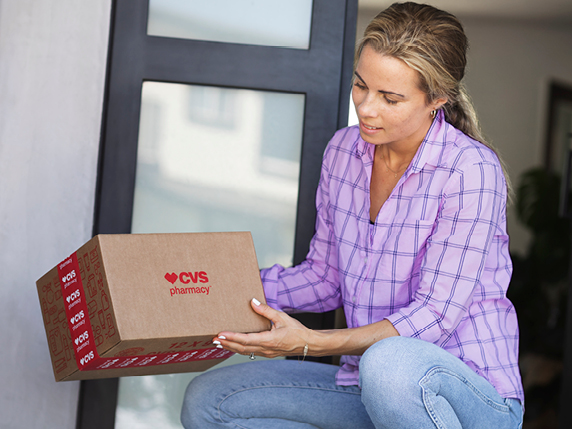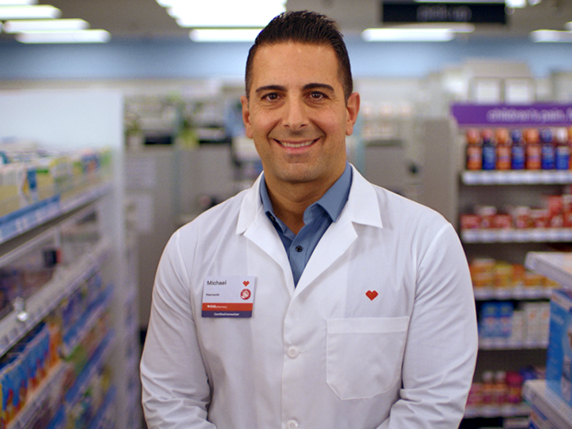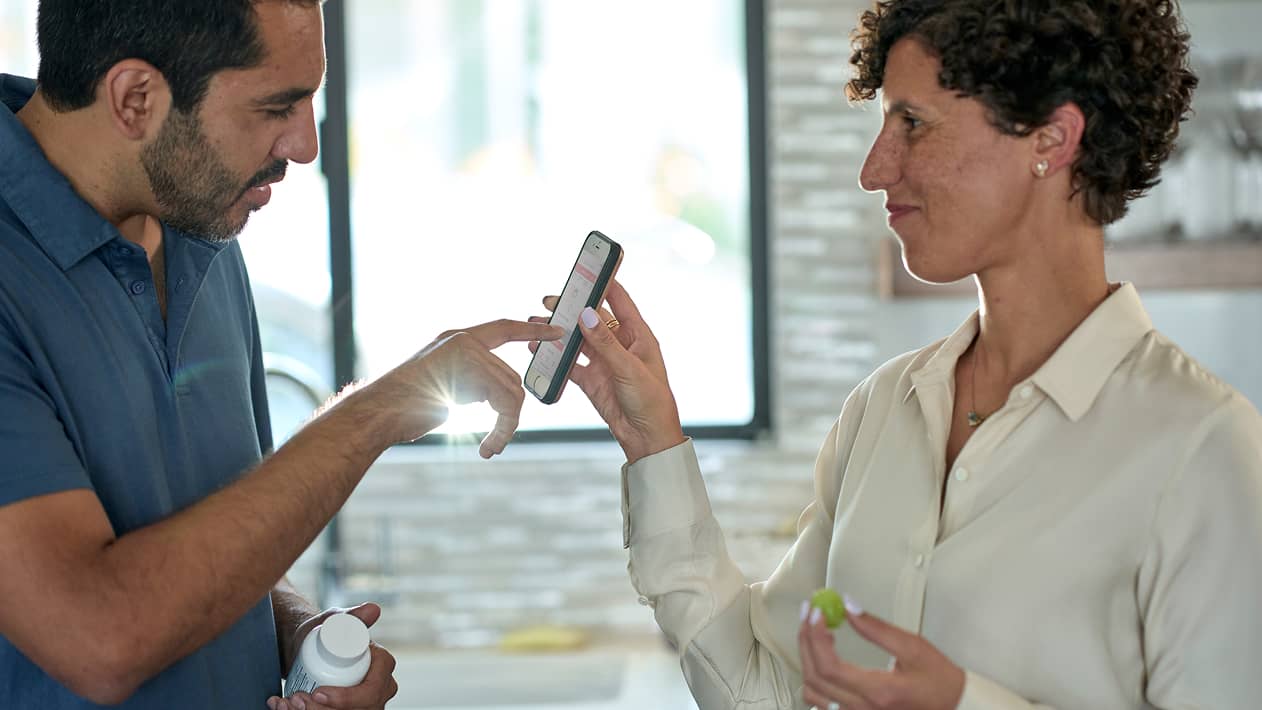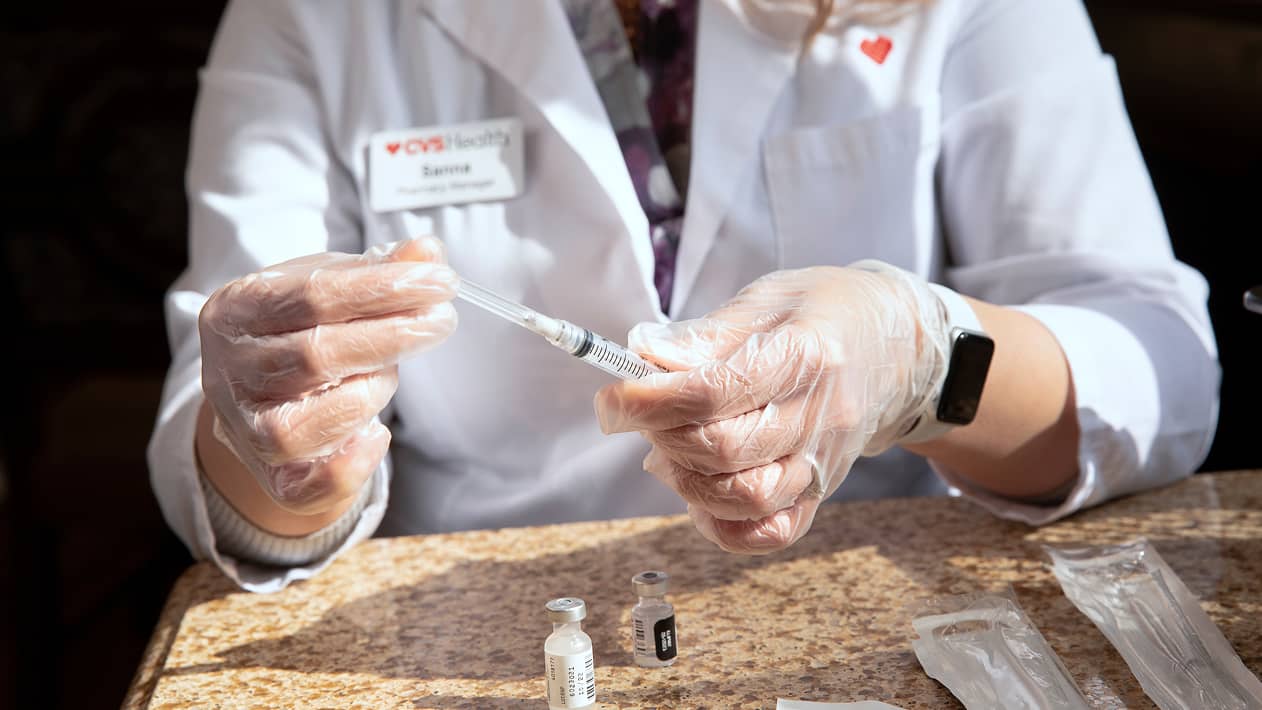
Jump to a specific topic
Curious about biosimilars? Here’s what you need to know
Breaking down biosimilars for you
First, let’s break down biologics, which are medications made from living sources. You might have taken one in the past or be on one now. Biosimilars are FDA-approved medications made to be highly similar to original biologics. They go through rigorous evaluation to ensure they have no clinically meaningful differences from the original biologics. That means they create a similar response in your body, are taken the same way and have the same possible side effects. In other words, you can be confident that biosimilars work the same and are as safe as their original biologics.
CVS Specialty is available to provide you with personalized support as you start or consider starting on a biosimilar, and will help you stay on track with your medication treatment plan.
So, what exactly ARE biosimilars?
A biosimilar is an FDA approved medicine that has been developed to be highly similar to the original biologic reference product and has no clinically meaningful differences compared to it. Biosimilars work the same way as the original biologic reference product by creating a similar response in your body. They are taken the same way and have the same possible side effects.
Biosimilars are not a new concept and have been available and used successfully for years. Biosimilars may be more cost effective for you and provide greater access to biologic and biosimilar treatment options. When there is more than one medication available to treat a condition, pricing usually becomes more competitive. We work to keep costs the same or less for you as you are making this transition.
Our CVS Specialty CareTeam is ready to assist you with all of your biosimilar needs, from injection training and nursing to connecting you with needs-based and non-needs-based financial assistance programs.
We are always available to chat and answer any questions online 24 hours a day.
We will work with your healthcare provider to obtain a new biosimilar prescription when required by your prescription benefit plan.
Our dedicated teams will help guide you and keep you informed every step of the way.
Keeping you healthy is our top priority.

Check if biosimilars treat your condition
Right now, biosimilars are available to treat conditions like Crohn’s disease, ulcerative colitis, irritable bowel disorder, rheumatoid arthritis, psoriatic arthritis, ankylosing spondylitis, macular degeneration, multiple sclerosis, certain cancers and diabetes. If your condition isn’t listed, know that more are being developed. Talk to your doctor to see if biosimilars are right for you.

Prescribed a biosimilar?
You have new options for Humira and Stelara.
Options for your health are always a good thing. Biosimilars for Humira and Stelara are FDA-approved. They’re safe, effective and may cost you less. There may be other biosimilars available for other conditions, too. Together, you and your doctor can decide what’s right for you.

The big picture of biosimilars
In many cases, biosimilars may cost less. Their lower price doesn't mean they don't work as well. When there's more than one medication available to treat a condition, prices can be more competitive. This helps offer more access to all.
Starting biosimilars? You're not alone
CareTeam
Your CarsTeam is here for you, with real-time chat, for support with your medication therapy.
They're available from 8 AM to 9 PM ET Monday to Friday and 9 AM to 6 PM ET Saturday to Sunday.

Copay assistance
Need help managing costs? We can guide you
to financial assistance programs.

Medication support
Got questions about symptoms, side effects,
dosage or any other aspect of your medication?
We're here to help.

Injection training
Injecting biosimilars can be tricky. But you're not alone. We can connect you to manufacturer
injection training.

About Biosimilars
Biologics are medications made from living sources. They're complex to make. Some examples of biologics are insulin, hormones and vaccines. Biosimilars are highly similar to the original biologic (reference product). They're already approved by the U.S. Food and Drug Administration (FDA). Biosimilars have no clinically meaningful differences compared to the biologic. They're as safe and effective. They offer the same treatment benefits. They have the same risks. Both are approved by the FDA to treat conditions like Crohn’s disease, rheumatoid arthritis, ankylosing spondylitis, diabetes and more. Visit Biosimilar Basics for Patients to learn more.
Yes. Biosimilars and generics are both versions of medications already approved by the FDA. Biosimilars are made from living sources. They're complex to make. They have no clinically meaningful differences from original biologic (reference product). Generics are copies of brand-name drugs. They're usually made from chemicals. Like generics, biosimilars may cost less. But lower cost doesn't mean they're not safe or effective. Manufacturers rely on the FDA's finding that the original biologic was safe and effective. Both biosimilars and generics may offer lower-cost options to more people.
Yes. If you're already using a biologic that works well, your provider might suggest that you change to a biosimilar. Especially if it costs less. Sometimes, prescription benefit plans change. They'll only cover a biosimilar. The FDA makes sure that biosimilars are as safe and effective as the original biologic (reference product). They have the same risks and benefits. Most are available in the same strength, dosage and device type as the biologic, too.
Yes. You can take a biosimilar even if you've never used a biologic. They may be an option to treat your condition. A biosimilar is highly similar to the original biologic (reference product). It has no clinically meaningful differences. It has the same risks and benefits. Biosimilars may cost less. Some prescription benefit plans may only cover the biosimilar. Not all original biologics have a biosimilar option.
Let's say you’re diagnosed with psoriatic arthritis. Your provider might feel that you could benefit from a specialty medication like Humira or Stelara. There are biosimilars for both. Check your prescription benefit plan. Find out which options are covered. Then, you and your health care professional can decide what treatment is right for you.
It depends. Biosimilars may cost less. You have access to more options to treat your condition. That often helps lower costs. But that doesn't mean it's less effective or safe. Just like biologics, biosimilars must be approved by the FDA. They're highly similar to the original biologic (reference product). They have no clinically meaningful differences. Check with your prescription benefit plan. Learn which treatment options are covered.
There are many ways to learn more about biosimilars. First, check out Biosimilar Basics for Patients from the FDA. It's available in English and Spanish. You'll find FAQs, infographics and other info on biosimilars. The websites of nonprofit foundations and patient advocacy groups for your condition have info on biosimilars, too. Try the Arthritis Foundation and Crohn’s & Colitis Foundation. Visit our CVS Specialty Patient Resource Center for Biosimilars for more info. Or contact your provider or the CVS Specialty CareTeam.
Biosimilars for Humira and Stelara
Most biosimilars for Humira are FDA-approved for the same conditions as Humira. These include ankylosing spondylitis, Crohn’s disease, hidradenitis suppurativa, juvenile idiopathic arthritis, plaque psoriasis, psoriatic arthritis, rheumatoid arthritis, ulcerative colitis and uveitis. There are a few exceptions for individual medications and pediatric uses. Check with your prescription benefit plan. Find out what medications are covered. Your provider or CVS Specialty® pharmacist can help if you have questions.
Most biosimilars for Stelara are FDA-approved for the same conditions as Stelara. These include Crohn’s disease, plaque psoriasis, psoriatic arthritis and ulcerative colitis. There are a few exceptions for individual medications and pediatric uses. Check with your prescription benefit plan. Find out what medications are covered. Your provider or CVS Specialty® pharmacist can help if you have questions.
No. Biosimilars are highly similar to and have no clinically meaningful differences than the original biologic (reference product). You can expect the biosimilar to be as safe and effective as the original biologic. Every biosimilar is approved by the FDA. Biosimilars have the same treatment risks and benefits. Most are available in the same strength, dosage and device type as the biologic. Not all original biologics have a biosimilar option.
Depending on the biosimilar for Humira, strength and dosage, the medication delivery device may vary slightly. But it’s similar to what you’ve used before. The biosimilar for Humira will either come in a pen, an autoinjector or a pre-filled syringe (PFS). All devices are easy to use. They’re self-administered under the skin (subcutaneous). If you need additional support, we’ll connect you to the manufacturer. They can give you injection training videos and education.
Depending on the biosimilar for Stelara, strength and dosage, the medication delivery device may vary slightly. But it’s similar to what you’ve used before. The biosimilar for Stelara will either come in a pre-filled syringe (PFS) or a single dose vial (SDV). They’re self-administered under the skin (subcutaneous). If you need additional support, we’ll connect you to the manufacturer. They can give you injection training videos and education. If you’re just starting on Stelara or a biosimilar for Stelara, the first dose is given as an intravenous (IV) treatment by a health care professional.
CVS Specialty® has a specially trained CareTeam. It’s dedicated to support you as you transition to alternative medications, including biosimilars. Pharmacists and clinicians are available to answer your medication questions. They’ll help make the change as seamless as possible. Visit the Biosimilar Basics for Patients on the FDA website to learn more about biosimilars.
Getting Started
It depends. If you fill your prescription for Humira or Stelara at CVS Specialty® and your prescription benefit plan has made a formulary change to no longer cover your original biologic (reference product), CVS Specialty will contact your provider. They’ll go over alternative medications covered by your plan. Your provider can review your prescription benefits plan and select the appropriate covered medication. No action is needed from you at this time.
It depends. If you already have a prior authorization (PA) for Humira, most prescription benefit plans will transition the existing Humira PA to the covered biosimilar. If your Humira PA has expired or your provider selects another therapy, then a new PA will be required.
If a biosimilar for Stelara or new medication is selected, a new PA is required. Your provider will need to send a new prescription and submit a new PA. Contact your prescription benefit plan for more information.
Yes. If you’re affected, most prescription benefit plans will notify you by mail 30-60 days before changes are made to the list of covered medications. The letter will inform you that your original biologic (reference product) will no longer be covered. It will list covered alternative medications and when the change will happen. CVS Specialty® will contact your provider. They’ll go over alternative medications covered by your plan. CVS Specialty will continue to fill your original biologic until the new medication coverage starts. After that, you’ll receive the alternative medication selected by your provider.
If you’ve signed up for digital communications, you’ll get a notification that CVS Specialty has received a new prescription from your provider. You may also receive messages with links to biosimilar resources. You’ll get info on how to contact us if you need support.*
If you don’t fill your prescriptions with CVS Specialty, contact your specialty pharmacy or your prescription benefit plan for additional information.
Yes. CVS Specialty® CareTeam pharmacists and clinicians are specially trained to support treatment for complex conditions and rare diseases. The CareTeam can give you the support you need. They’ll help you stay on track with your medications. They are also able to help you identify medication side effects. They’ll help you understand changes in benefits. And they’ll communicate with your provider if needed. Visit our CVS Specialty Patient Resource Center. Learn more about your condition and how to manage it. If you need to connect with the CVS Specialty CareTeam, log in to your CVSspecialty.com account and live chat with us.
For patients transitioning to a biosimilar for Humira or Stelara, CVS Specialty has a dedicated CareTeam for autoimmune conditions, like rheumatoid arthritis, Crohn’s disease and psoriasis. Your CareTeam can help you learn what to expect as you take your medication. They’ll let you know when to contact us or your provider. They can even connect you to the manufacturer for injection training videos and nurse support.
If you are new to CVS Specialty, welcome. We do more than just provide specialty medications. With a personalized CareTeam, helpful digital tools* and the choice of medication pickup or delivery**, we’re here to help make living with your condition a little easier. Visit our Getting Started with CVS Specialty site for helpful resources and to create an online account. Once registered, check order status. and send secure messages to your CareTeam.
Yes, we recommend it. Register at CVSspecialty.com. Or use our mobile app once you’ve received your first medication shipment. If you haven’t received your first medication shipment, pre-register at CVSspecialty.com/digital. With a CVSspecialty.com account, you can sign up to receive text messages and emails. You must provide consent to receive digital communications. Along with receiving refill and shipping notifications, you can change a medication delivery or schedule an in-store pickup at any CVS Pharmacy®**. And if needed, you can securely message your CVS Specialty® CareTeam.
Financial Assistance
It depends. Biosimilars may cost less for you. They give you more access to treatment options. When there’s more than one medication available to treat a condition, prices usually are more competitive. Your out-of-pocket costs depend on a few factors. These include your prescription benefit plan, covered medications and available financial assistance programs.
It depends. Some biosimilars have their own manufacturer patient support and copay assistance programs. CVS Specialty® can connect you to third-party financial assistance programs. If you know the biosimilar covered by your plan, visit the manufacturer website. Find info on their financial assistance programs.
Yes. CVS Specialty can help connect you to third-party financial assistance programs. If you’re approved for assistance, you typically qualify for one year. Some financial support has an amount limit. You must reapply each year. Funding is different for each manufacturer, organization, foundation or program. Payor requirements may affect whether you’re eligible or how much assistance is available.
Yes. Many non-profit foundations and patient advocacy groups have resources to help you with out-of-pocket costs. These programs help underinsured or uninsured people afford medical treatment and medications. For example, the PAN Foundation has funds that cover more than 70 conditions. You can sign up for FundFinder. You’ll be added to a wait list. They’ll contact you when funding is available. Contact the CVS Specialty® CareTeam for help to find available resources. They’ll connect you to third-party financial assistance programs through manufacturers, charitable organizations, discount programs and more.
Prescription benefit plans vary in how they deal with copay cards and patient assistance programs (PAP). Some count the copay toward your deductible or out-of-pocket (OOP) maximum. In these cases, your deductible and OOP costs may be less. Other plans have a copay accumulator program. They don’t count the copay card or PAP towards your deductible or OOP. In those cases, you may be responsible for paying the entire deductible and OOP amounts based on your prescription benefit plan. It’s important to know how your plan deals with PAP and copay cards.
Resources
-
Food & Drug Administration
Tried and true tips and tricks for coping with hair loss.
-
Arthritis Foundation
This foundation has a great summary of what you need to know.
-
Crohn’s & Colitis Foundation
Get info on what biosimilars mean for this condition.
-
Hidradentis Suppurativa Foundation
Managing HS? This foundation has specific resources for you.
-
National Psoriasis Foundation
Find articles and podcasts on biosimilars for psoriatic disease.
-
Ocular Immunology and Uveitis Foundation
Explore the foundation committed to ocular inflammatory diseases.
Are you a health care provider? You might be looking for these
-
Available biosimilars
Search biosimilars available through CVS Specialty®.
-
Enrollment forms
Find enrollment forms for your specialty therapy.
-
Streamlined processes
Learn how we can help simplify biosimilar transitions.
-
** Specialty delivery options are available where allowed by law. In-store pick up is currently not available in Oklahoma. Puerto Rico requires first-fill prescriptions to be transmitted directly to the dispensing specialty pharmacy. Products are dispensed by CVS Specialty® and certain services are only accessed by calling CVS Specialty directly. Certain specialty medication may not qualify. Services are also available at Long’s Drugs locations.
For Biosimilar Claims Sources:
FDA (U.S. Food and Drug Administration)
U.S. Food & Drug Administration. Biosimilars: What Patients Need to Know. Accessed April 30, 2025.
Arthritis Foundation. Biosimilars: What You Should Know. Accessed April 30, 2025.
This information is not a substitute for medical advice or treatment. Talk to your doctor or health care provider about your medical condition and prior to starting any new treatment. CVS Specialty® assumes no liability whatsoever for the information provided or for any diagnosis or treatment made as a result, nor is it responsible for the reliability of the content.
CVS Specialty® does not operate all the websites/organizations listed here, nor is it responsible for the availability or reliability of their content. These listings do not imply or constitute an endorsement, sponsorship, or recommendation by CVS Specialty®.
This document contains references to brand-name prescription drugs that are trademarks or registered trademarks of pharmaceutical manufacturers that are not affiliated with CVS Specialty®.
